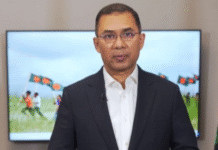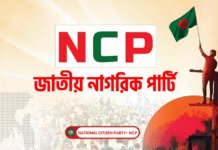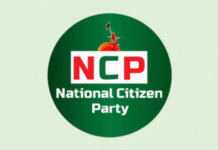Prothom Alo
Dhaka

Bangladesh Nationalist Party (BNP) and Jamaat-e-Islami have taken a contrasting stance on the constitution and basic principles of the state. The Constitutional Reform Commission has recommended deletion of secularism, socialism and nationalism as fundamental principles of the Constitution and the fundamental principles of State Policy. BNP does not agree with these recommendations while Jamaat does.
However, Jamaat has asked to remove the word ‘pluralism’ from the recommendation of the Constitutional Reform Commission to include ‘equality, human dignity, social justice, pluralism and democracy’ as the basic principles of the constitution. The party has expressed its opinion to add the words ‘full trust and faith in Almighty Allah, religious and social values’ as the basic principles of the constitution before ‘equality, human dignity, social justice, pluralism and democracy’.
Jamaat has expressed this opinion on the recommendation of the Constitutional Reform Commission submitted to the National Consensus Commission. On 20 March, a delegation led by the party’s Secretary General Mia Golam Parwar, submitted its opinion on the recommendations of the five reform commissions, including the constitution. Two days later, on 23 March, BNP submitted its opinion. The separate opinions revealed the different positions of the two parties on the issue of the constitution and the basic principles of running the state. Although the two parties were in the same alliance for a long time, political hostility between them has been increasing in recent times.
The Constitutional Reform Commission’s proposal states that the basic principle of the constitution is, ‘Bangladesh is a pluralistic, multi-ethnic, multi-religious, multi-lingual and multi-cultural country, where coexistence and due dignity of all communities will be ensured.’ Jamaat partially agreed with this and proposed to drop the word ‘pluralistic’ and replace it with the words ‘Citizens of Bangladesh, regardless of race, religion, caste and ethnic identity, shall enjoy due dignity and more.’
On the other hand, BNP disagreed and said that it is more appropriate to restore articles 8, 9, 10 and 12 of the constitution to their pre-15th Amendment status. Article 8 of the Constitution states, “The principles of nationalism, socialism, democracy and secularism, together with the principles derived from those as set out in this Part, shall constitute the fundamental principles of state policy.”
Articles 9, 10 and 12 speak about nationalism, socialist economic system and the implementation of the policy of secularism to be the other principles.
BNP finds it more appropriate that these articles are retrieved to the pre-15th amendment state. The 15th amendment to the constitution was passed in parliament on 30 June in 2011 repealing the caretaker system of government.
Writer and researcher Mohiuddin Ahmed thinks the BNP’s stance on the question of fundamental principles on state policy is derived purely from the party perspective. He said BNP wants the constitution to be returned in the same state in which it was when the party was in power for the last time. BNP doesn’t even want the four principles of 1972. They basically want what was done through the ordinance in 1976. In 1976, Ziaur Rahman had removed the four principles of the 1972 constitution through the ordinance. This gives Jamaat political advantages. Therefore, Jamaat wants those four principles to be abolished.
However, Mohiuddin Ahmed mentioned that the Reform Commission’s recommendation of ‘pluralism’ in the principles of the constitution is very ‘relevant’. He considers the state practice of ‘secularism’ and its conceptual aspect as ‘misleading’.
The National Citizen’s Party (NCP), the new party of the youth who led the July mass uprising, has also agreed with the recommendation to include ‘equality, human dignity, social justice, pluralism and democracy’ in the constitution, replacing nationalism, socialism and secularism as the fundamental principles of state. However, it has objected to the recommendation of the Constitutional Reform Commission to change the name of the state. It has also stressed the need to define pluralism precisely.
Agreement on 31 out of 70 questions on constitution
The spreadsheet submitted to the consensus commission showed Jamaat agreeing to 31 out of 70 questions on constitution, disagreeing to 23 questions and partially agreeing to 16 questions.
The constitution commission recommended replacing the Bangla words ‘projatantra (Republic)’ and ‘gonaprajatantree Bangladesh (People’s Republic of Bangladesh)’ with the words ‘nagariktantra (Civic Republic)’ and ‘jonaganatantree Bangladesh (Democratic Republic of Bangladesh)’ respectively, but Jamaat does not agree to it. The constitution commission, however, recommended retaining the words ‘Republic” and ‘People’s Republic of Bangladesh’ in the English version of constitution.
The constitution commission also recommended the deletion of Articles 7A and 7B of the constitution on the offences concerning the constitution and limitation on amendments of the constitution. Regarding this, Jamaat agreed to the deletion of Article 7B and recommended inclusion of a clause in Articles 7A, and that is ‘Neither any repeal, abrogation, cancelation or suspension of constitution through any mass revolution or mass uprising nor any such initiative, if it is undertaken, will be deemed an offence.’
Jamaat agreed to the recommendation on ‘The minimum age for contesting parliamentary elections shall be reduced to 21 years’, but disagreed to electoral system where 300 constituencies of the parliament will be open for all candidates and 100 designated constituencies will be for women only. Rather, the party said, “Election will be held in 300 constituencies under proportional representation (PR) electoral system and 50 seats reserved for women will be nominated by political parties under PR system.”
Jamaat partially agreed to the recommendation on the nomination of one of the two deputy speakers from opposition and said the deputy speaker of the opposition will be elected by the members of parliament other than the ruling party.
The party also disagreed to the recommendation on “a member of Parliament not holding more than one of the following offices at the same time: (a) Prime Minister, (b) Leader of the House, and (c) Head of a political party.” Jamaat proposed a member of Parliament will not hold more than two positions at the same time.
Jamaat proposed a five-year term for the both houses, general election in 300 seats and of Lower House and nomination by political parties in 50 reserved seats through PR system.
The party partially agreed to the recommendation on the members of the Lower House having the liberty to vote against the political party that nominated them except for votes on Money Bills. Jamaat, however, added vote of confidence with Money Bills.
The reform commission recommended consisting of the Upper House of a total of 105 members, including five of them to be nominated by president. Jamaat advocated for 100 members and no nomination of five members by president for the sake of a complete practice of democracy.
Jamaat partially agreed to the commission’s recommendation on the term of office of the President being four years and no President shall serve more than two times. The party wants the term of office of the President to be five years.
On declaration of state of emergency
The commission recommended that the president may declare a state of emergency only on the basis of a decision of the National Constitutional Council (NCC); the fundamental rights of citizens cannot be abrogated or suspended and the right of access to the courts cannot be curtailed or suspended during a state of emergency. Therefore, the Commission recommended the deletion of Articles 141B and 141C.
Jamaat only agreed to the commission’s recommendation on “the president may declare a state of emergency on the basis of a decision of the NCC.’
Whereas BNP said since the declaration of a state of emergency is intricately involved with the executive part of the government, it is not proper to bestow the power related to this matter to any authorities other than the government and the parliament.
BNP, however, could understand the reasons for declaring a state of emergency without abrogating or suspending the fundamental rights of citizens.
‘Absolute trust and faith in Allah’
The Preamble of constitution contained the text ‘absolute trust and faith in the Almighty Allah’ until it was taken out by the Fifteen Amendment. Now, Jamaat wanted the inclusion of “absolute trust and faith in the Almighty Allah’ in addition to inserting words ‘religious and social values, equity, human dignity, social justice and democracy’ in the fundamental principles of constitution.
Regarding this, Jamat secretary general Mia Golam Parwar told Prothom Alo, “We think an absolute trust and faith in the Allah is a fundamental issue, and we proposed the inclusion of it in constitution after detailed decisions at the party policy levels.”
“We want change to the fundamental principles of constitution because secularism and socialism do not go with the people of Bangladesh, as well as questions on beliefs and morality of this community also lies with it,” he added.
This Jamaat leader claimed that secularism and socialism did not arise during the movements of self-determination. Secularism and socialism were included in the fundamental principles of Bangladesh’s constitution in light of the constitution of India.









